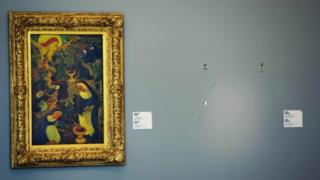Stolen Picasso found in forest a ‘hoax’
What was thought to be a stolen artwork by Pablo Picasso recently discovered in Romania has been revealed as a forgery.
Experts had hoped that the painting was Harlequin Head, snatched from the Kunsthal museum in Rotterdam in an infamous art heist six years ago.
A Belgian theatre company duped a Dutch writer, who wrote a novel based on the daring robbery, into thinking she had found the missing artwork in Romania.
It says it staged the hoax as part of a project about the value of truth.
The theft of the century, as the 2012 heist was dubbed by local media, saw pieces by Picasso, Monet, Matisse and others taken in three minutes.
Four Romanian art thieves were jailed for the heist, but the seven artworks – estimated to be worth as much as €200m (£160m) at the time – were never recovered.
Some of the pieces are feared to have been burned by one of the robber’s mothers – who told local media she incinerated the paintings after police began searching her village. She later retracted her confession.
Romanian authorities were given a canvas on Saturday night, thinking it “might be” Picasso’s painting, which is estimated to be worth €800,000 (£710,000).
Dutch writer Mira Feticu had dug up the artwork wrapped in plastic in a Romanian forest, after receiving an anonymous letter around 10 days before.
On Sunday however, Ms Feticu, who is of Romanian origin, told news agency AFP the tip-off “with instructions regarding the place where the painting was hidden” was a “publicity stunt”.
She told Dutch public broadcaster NOS she was duped as part of a “performance” by two Belgian directors who emailed to explain the letter was part of a project called True Copy, dedicated to the notorious Dutch forger Geert Jan Jansen.
The master forger spent decades making fake paintings, and selling them off as original Picassos, Klimts and Appels before he was finally caught in 1994.
The production company says on its website it would not comment further for the time being.
Source: Read Full Article



